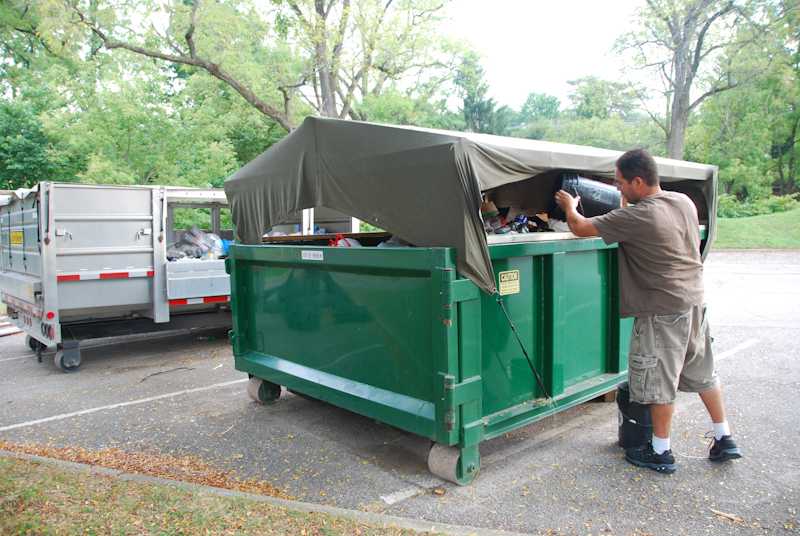Oberlin Recycling Pickup Set to Return in October
Community member Ruy Lopez disposes of his recycling in a bin behind City Hall. Oberlin’s municipal recycling pickup services halted after a fire in February destroyed the city’s garbage and recycling trucks.
September 12, 2014
The city of Oberlin estimates municipal recycling pickup services will resume by the middle of October, returning after last February’s garage fire destroyed all six of Oberlin’s garbage and recycling trucks, limiting recycling services to two dropoff centers.
Members of the student-run Resource Conservation Team have been offering limited additional recycling services to the College and town since March.
“We are still surprised that the city hasn’t come up with anything, or the College hasn’t come up with anything a little more sustainable,” said RCT member and College third-year Isabel Guerra.
Since the fire, the RCT has been the only organization to provide services for recycling pickup. Recycling in academic buildings resumed in March and continued through mid-May.
Initially, the RCT’s services were
limited to the Oberlin Student Cooperative Association and Village Housing. Although the RCT was available to provide its services to all of OSCA, the only co-ops to consistently recycle were Pyle Inn and Keep Cottage. The pickups in the spring of 2014 pro- duced roughly 50 to 80 bags of recycling per week.
“I feel like there are just a handful of concerned students … who are actually cleaning up the trash, who are aware that this is a big problem, that the recycling trucks are a big problem,” said Guerra. “But it’s not really on anyone’s … mind just because … the recycling bins are still there, they’re just not going to the place that they should. So basically I think no one actually sees that it’s a problem.”
The RCT continued its efforts in the summer with three members, Guerra, College sophomore Jacob Wilson and College junior Shavonne Stanek. They made biweekly recycling runs for students in off-campus housing and for the College’s summer conferences.
Since pickup services stopped, there has been a significant decrease in recycling in the city. The city’s Refuse and Recycling department found that in the first half of 2014, the department collected 55 tons of mixed recycling from the city’s dropoff point, compared with 230 tons of mixed recycling collected in the first half of 2013 with curbside pickup.
This decrease has significant implications for the department’s budget, which depends heavily upon a yearly grant from the Lorain County Solid Waste District. The funds given by the grant are based on what the city has recycled during the previous year.
“I’ve had to walk around, especially this summer, with blinders on, because there’s just so much recycling out there that I know is going to the landfill,” said Lori Sprotsy, Oberlin’s Refuse and Recycling coordinator.
The new trucks purchased by the city are custom-built, and their exact arrival time is unclear. The vehicles are automated side-load trucks with hybrid hydraulic drive systems and will use half as much diesel fuel as the old trucks. Residential rates will rise by $.50 starting in 2015 due to the cost of the hydraulic hybrids.
Along with the new trucks, the city plans to implement a cart system of mixed recyclables. The plan will provide each residence with up to two 64-gallon containers without charge, in which unsorted recycling can be placed.
“Our cart system will definitely in- crease our recycling,” said Sprotsy.
There has not yet been a public forum discussing the new cart system or the use of hydraulic vehicles. A public meeting is expected to be organized this month as carts are being distributed.





















